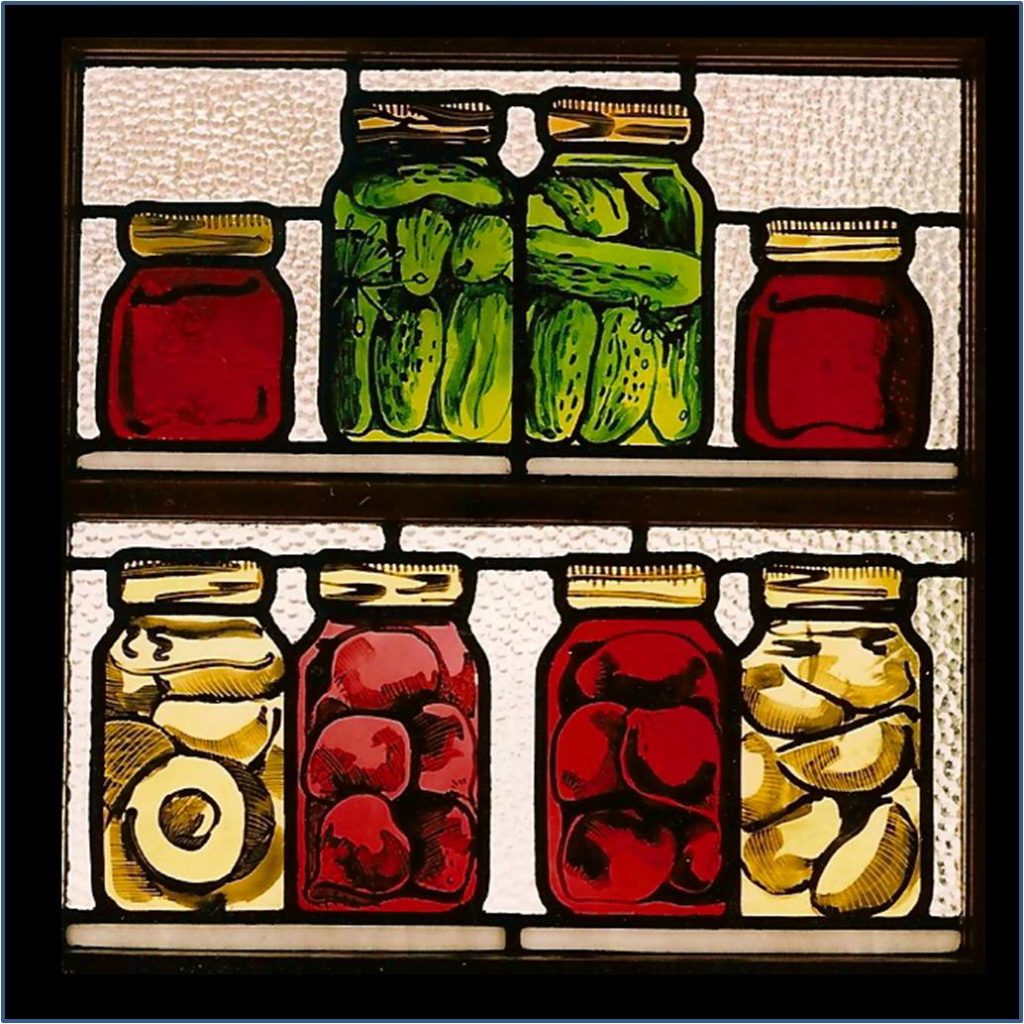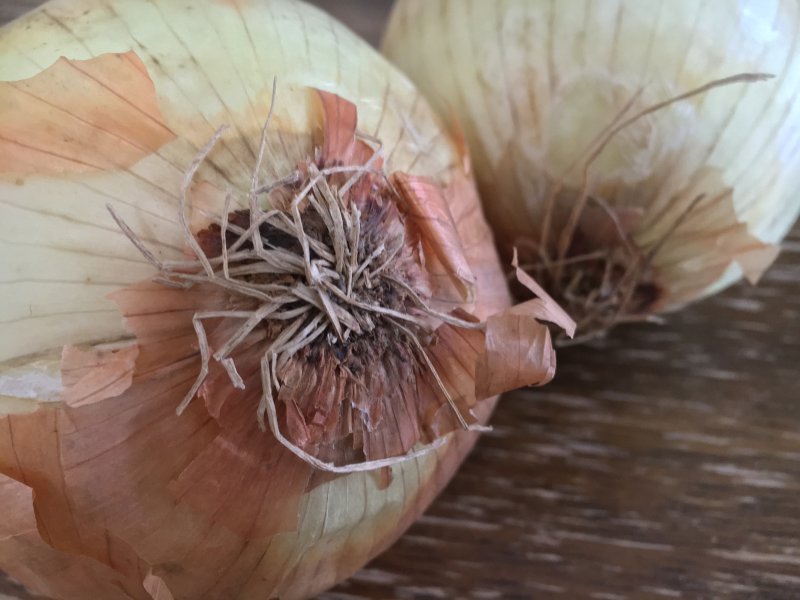Five pounds of yellow onions sit beside my cutting board. I hold a large dull chef’s knife. The cutting board is wooden and scored by years of use—a haven for E. coli, surely. The alternative is one of the large plastic boards, also rutted by use. Which is the dangerous one: wood or plastic? I don’t remember and there is no wifi here at Hope Kitchen.
My task is to chop onions, sorting through the pile for spots of mold and “squishy bits.” Because I wear glasses, the kitchen wisdom is that I will not be reduced to tears while I sort and chop. The cooks want as much as I can salvage, for the soups, the meatloaf, and the salads. While I work, Shelley brings me another two or three pounds of onions found at the bottom of a box of vegetables donated by the Co-Op.
At least now I have an explanation for tears.
After Roger died, I discovered I couldn’t cook. I did not know how to make soup, stew, paella, rice pilaf, stir fry, potato omelettes. He cooked these meals. When we knew he was dying, he asked me to promise I would prepare, cook, and eat “proper” meals every evening. I promised. Of all the promises I made during the last six months of his life—to ensure he was dead when they cremated him; to burn his gi; to sell his dress blues; to save his medals for our children; to read War and Peace; to keep his ka-bar—promising to cook a proper meal was the least of my worries.
After the first shock, when my life without my partner of thirty-five years began, I discovered among many harsh discoveries—I couldn’t start the chain saw—that I was clueless in the kitchen. I found jars of sauerkraut, hot sauce, raisins, a tiny foil slip of Spanish saffron, his favourite Uncle Ben’s converted rice, smoked paprika, packages of frozen chorizo. I did not know what to do with any of it. I did not know how to cook the meals he made for us over the years. His recipes were in his head, departed with him. Recipes on the internet did not yield the tastes, the smells, the textures of the stews and soups he had produced. I didn’t feel like eating anything I cooked.
I had to learn to cook to keep my promise to my dead husband.
I fetched up our community soup kitchen, where hot meals were prepared and served at 12:30 three days a week. When I called the coordinator to volunteer, she asked me about my specialties and I replied, “I can do what I’m told.” She assigned me to the Monday crew. I arrived for my first stint three months after Roger died, so stunned with grief I was speechless and often motionless. I had to be escorted to the grocery store, or I would forget what I was looking for and leave with random items, such as popcorn.
I am sure the Monday crew were hoping for someone with experience and skills. They got me instead. I remember the lead hands, Michael and MaryAnn, looking with interest turning to apprehension when I appeared in the doorway asking if they needed any help. “What’s your specialty,” I was asked again. I looked around the large, ramshackle commercial kitchen, figuring “oatmeal porridge” was not the answer.
“I do what I’m told,” I replied. “I can also peel and chop.”
“Can you open jar lids?” they said, eyeing my stocky late-sixties body.
“Yes.”
Michael waved me forward with his formidable chef’s knife. “Put on a hat and apron. Wash your hands. Don’t sneeze into anything.”
And we laughed, me with my pathetic imitation of person who is not so overwhelmed with grief she can’t breathe.
It became obvious I was not being modest. I didn’t know how to do anything. Chopping enough carrots for a soup to feed forty, asked to cut them in coins, I produced cubes. Prepping ten pounds of broccoli into florets too large to cook quickly in the stir fry. Cutting the bad bits out of eight red and orange peppers and missing the labels. Salvaging “vine-ripe” tomatoes so moldy they poisoned the pasta sauce. None of the peelers worked. I couldn’t get any of the can-openers to open cans. Every knife was dull except the set Michael brought to the kitchen every week, which we guarded with our lives.
I chopped. Not quickly or efficiently. For weeks, every Monday at ten, I arrived and chopped. Onions. Potatoes. Celery. Carrots. Turnips. Parsnips. Cabbage. Apples. I did not have much to say. I suspect someone told Michael and MaryAnn I was a new widow, and while they understood, they did not mollycoddle me. If I started leaking tears, no one rushed to rescue me.

Sweet Spanish by Shirley Harshenin
Our local radio station DJ played music for us. Michael, a musician as well as a cook with years of experience, would heckle the play lists. I tore up bread for his bread puddings, prepared apples and plums for cobblers, formed hamburger into meatballs, cracked eggs, sifted flour.
When there was nothing else I could chop, I washed prep pans, stainless steel bowls, and the massive cauldrons that accumulate in a commercial kitchen. I cleaned the fridges and freezers, opened unlabelled jars and peered into mysterious plastic buckets, sorted vegetables, inspected packages and cans for best-before dates, set rat traps.
While I did what I was told, I also listened. Michael and MaryAnn would inspect the boxes of surplus produce from the Co-op, our only grocery store, discuss what to make with what we had, and do it. It was magic, to make something out of not enough. At ten o’clock they would be looking into the boxes and at 12:30 we had two mains, two soups, side dishes, salad, and dessert. My talent for finding random things in the fridges began to come in handy. We rarely had enough of anything. Every meal was an improvisation. Making do. Without the essentials. Such as husbands.
Early in the morning, men would start the fire in the wood stove in the dining hall, which was otherwise unheated, put on the coffee, and ask about milk and canned milk, sending me into one of the fridges to see what hadn’t curdled. Shortly after ten, men and women would come in, seeking warmth, and I would hear their voices. Sometimes there would be bursts of laughter and I would look up, bewildered, wondering what anyone could find to laugh about.
When serving time came, we lifted large trays onto the counter, Michael and MaryAnn served, and I hung back ladling soup. Those coming for a meal lined up, patient and expectant. Some had not eaten since their meal on Friday afternoon. After about ten minutes, “so they won’t ruin their meal,” I would carry the dessert into the dining hall. I couldn’t look at anyone. People smiled. Scowled. Argued with each other about conspiracies. Complained about their teeth if we served coleslaw. Complained about the free trade agreement if we served beef.
In our small community, many are inadequately housed and suffer food insecurity. That is city-planner talk for cold and hungry. Yet here they are always ready to lift down the chairs, carry the dishes back into the kitchen, make small talk, check on each other, pitch in. I wore my grief like a flag, but no one referred to it. Men and women gathered at the wood stove, coffee or tea in hand, in the simplicity of warmth, conversation, and a comfort-meal in the offing: thick soups, sausages, mashed potatoes with kale, carrots and turnip mashed, beets—buttered if we had it—vegetarian gravy or light cream sauce, and cookies. Warm food and a brief release from cold and damp. From sorrow.
I came to know, though no words were spoken, we all carried sorrow into that kitchen, set it down for a time, and then picked it up as we went back into the world. I went home to my waiting dogs after each Monday meal, apron wet, often with a yogurt container of soup, returning to the grief I set aside while I learned to cook.
Keeping my promise to the dead.



